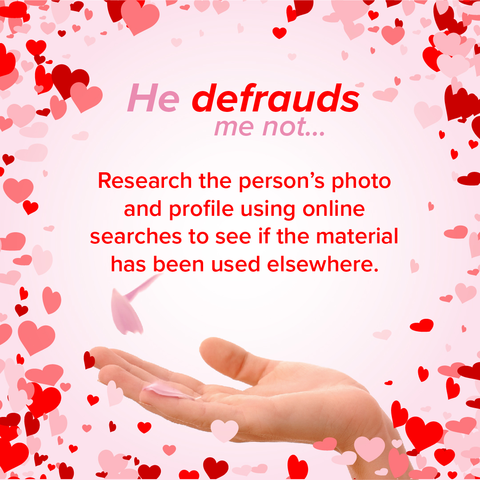ONLINE EXCLUSIVE
Dorothy Riggs, CFE
Regional Fraud Investigator, Synovus
According to FBI data, romance scams cause the highest financial losses among internet-facilitated crimes. The FBI's Internet Crime Complaint Center (IC3) cites reports from 12,000 victims of confidence frauds who reported losses of more than $82 million during the last six months of 2014 and nearly $200 million in 2015. The number of victims and loss amounts actually are higher because embarrassed victims often fail to report.
During my six-plus years as a regional bank fraud investigator I've delved into a legion of cases categorized as romance or sweetheart scams. You might believe that only simpletons fall prey to romance hustles, but con artists don't discriminate. Victims are male, female, young, middle-aged, elderly, benighted, well-bred and of various races, creeds and nationalities.
Even the most intellectual among romantic hopefuls often throw caution to the wind at the prospect of entanglement with a courtly seducer. Modern technology makes it incredibly easy for fraudsters to find their prey all over the world via cell phones, online dating websites, social media and email. Unfortunately, in far too many instances the victim's strong social desire for a romantic relationship leads them to a different kind of hanky-panky than they envisioned.
[Here is one example of a face to face scam]:
Rebecca is a college honors student. One day she met a good-looking guy named John as she walked to class and they exchanged pleasantries. He told her he was a fellow student who was new to campus, and after spending a few days getting better acquainted, he quickly started referring to Rebecca as "his girl."
One day at lunch Rebecca noticed that John lacked his usual cheerful demeanor. He said his vehicle had broken down and he'd received a check from his father to cover auto repairs and living expenses. But because he didn't know the name of the auto repair shop, his dad left the payee line blank and mailed the check with instructions to write in the shop's name. But when he presented the check to the auto repair shop they told him they'd only accept a check written for the exact amount of the repair and couldn't give any cash back.
John then asked Rebecca if he could make the check payable to her, let her deposit it into her account and then withdraw the cash for him. Of course she agreed — anything for her boyfriend!
After giving him the cash, Rebecca never saw or heard from John again. Of course, the check was counterfeit, and she was left holding the bag. John wasn't even a student at her university, and he'd reportedly conned at least one other girl.
Scamming from a distance
The first scenario involved face-to-face meetings with the scammers. However, in most online dating scams the victim and the charlatan never physically meet. The scammer — using a phony profile name, photo and details — initiates contact with his mark via an online dating site, chat room or social media platform. Then he or she immediately urges the victim to use a more private mode of communication such as text messaging, phone calls, instant messaging or email.
Victims have reported online dating relationships in which the scammer claimed to be in the military, working on an oil field, or as a developer overseas or in a different state. In each case, the fraudster said he planned on marrying his victim when he returned in a few months. He'd ask for her bank account data to have his payroll credited to her account via direct deposit so they'd have funds to start their new life together. However, he'd also ask the victim to send him a debit card to cover limited expenses in the meantime. Each victim provided her account data and sent a debit card to her beloved fiancé. However, no direct deposits credited the accounts. Instead, the fraudsters deposited counterfeit checks made payable to the victim into each account via mobile phone deposits and then drained the accounts via ATM withdrawals before the unsuspecting women realized what was going on.
What can we do to combat this type of fraud?
The massive number of individuals feeling social deprivation, the ease of technological communication and the criminal expertise of savvy fraudsters all set the global stage for a whole lot of hanky-panky. At networking events I often come in contact with various members of the fraud-fighting profession who share countless stories that resemble the ones described in this article. Bank fraud investigators, law enforcement professionals, attorneys, DHR caseworkers, accountants and the list goes on — we're all confronted with the pervasive issue of sweetheart scams. I'm convinced that our greatest weapon against this issue is education. We must tirelessly continue to educate the public through seminars, conferences, conversations, publications and all other viable platforms. "When you know better, you do better."
Read the full article and find seven common romance scam indicators on Fraud-Magazine.com.


